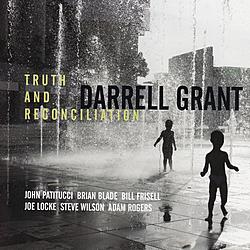MUSIC REVIEW BY Steve Leggett, All Music Guide
Pianist Darrell Grant showcases some of neo-bop's strengths on this ambitious two-disc set from Origin Records. Looking back to the bop era for inspiration, Grant also astutely mixes in classical elements, folk themes, flirts with light R&B, and walks surely and boldly into pop territory, all through a bop lens from the vantage point of the 21st century. Working with guitarists Bill Frisell and Adam Rogers, saxophonist Steve Wilson, vibist Joe Locke, drummer Brian Blade, and bassist John Patitucci, Grant balances trio, quartet, and quintet settings with a handful of vocal pieces (Grant sounds a bit like a slightly cautious Keb' Mo' when he sings, which is actually kind of endearing) into a loosely constructed suite that rose out of Grant's close study of the cultural and political struggles in South Africa. Adding to the recurrent themes of hope and freedom that emerge here are several spoken word samples from the likes of Martin Luther King, Jr., Gandhi, Nelson Mandela, John Kennedy, and Franklin D. Roosevelt that are carefully woven into the sequence at key points. That it all works is a testament to Grant's ability to balance accessibility with purpose, and Truth and Reconciliation, although it has a theme and several urgent points to make, never sounds like a treatise and avoids pretension somehow, even though it includes two versions of Sting's "King of Pain." Grant also visits Dizzy Gillespie's "Algo Bueno" here, along with Betty Carter's "Tight" (one of the best single tracks on Truth and Reconciliation, along with the sweeping "Blues for the Masters"), Jerome Kern's "The Way You Look Tonight," and a surprisingly effective treatment of Sheryl Crow's "I Shall Believe." Grant has constructed an approach to jazz and bop that is capable of being all things to all camps while still pursing his own creative and personal exploration, and this balancing act over what can be incredibly thin ice is a pretty impressive achievement. Grant is inquisitive, likeable, and skilled, and so is Truth and Reconciliation.
Soundclips
Other Reviews of
"Truth And Reconciliation":
JazzTimes by Thomas Conrad
Cadence by Marc Medwin
Downbeat, September 2007 by Robert Doerschuk
Rokovoko zine - online by Alexander C. Kafka
Pittsburgh Tribune Review by Bob Karlovits
Columbia Tribune / Columbia, Missouri by JON W. POSES
The Oregonian - May 27, 2007 by Lynn Darroch
Bopn' Dicks 10 picks June 2007 by Dick Crockett
Jazz Review by Glenn Astarita
Coda by Bill Barton
Primetime A & E, May 2007 by Nick's Picks
All About Jazz.com by Dan McClenaghan
Audiophile Audition by John Henry
Midwest Record Recap by Chris Spector
